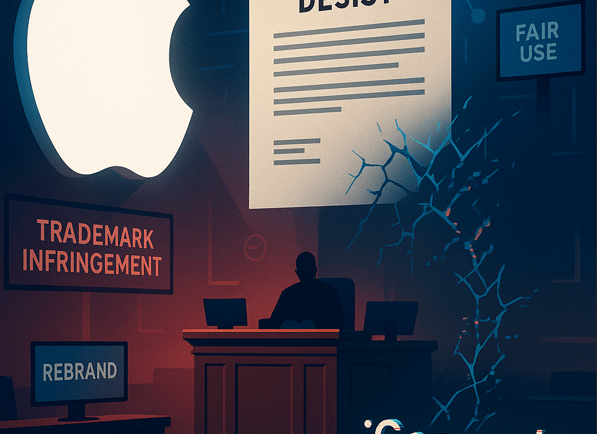CRITICAL ANALYSIS OF APPLE INC. OVER THEIR APP CALLED ‘ICONNECT
This critical analysis explores the legal and strategic conflict between Apple Inc. and a small tech startup over the use of the name ‘iConnect’—a social networking app developed independently but now facing legal pressure from Apple. The core of the dispute lies in trademark concerns, particularly Apple’s long-standing association with the “i-” prefix, used in products like iPhone, iPad, and iTunes. Apple claims that ‘iConnect’ could mislead consumers into believing there is an official connection between the two companies, especially given iConnect’s role as an Apple Premium Reseller. The analysis delves into key issues such as trademark infringement, brand confusion, contractual disputes, and the broader implications for startups operating in Apple’s ecosystem. It also examines potential legal defenses like fair use, nominative use, and expressive use, while weighing the practical risks and benefits of fighting, negotiating, or rebranding. Ultimately, this case highlights the power imbalance between tech giants and emerging businesses, the complexity of trademark law in the digital age, and the critical importance of strategic branding. The safest and most pragmatic path for most startups—particularly those within Apple’s distribution network—is often to rebrand early and avoid prolonged legal disputes.


SECTION 3 – CRITICAL ANALYSIS OF APPLE INC. OVER THEIR APP CALLED ‘ICONNECT’
INTRODUCTION
A small tech startup launched a social networking app named iConnect and is now facing a cease and desist letter from Apple Inc., alleging that the name is infringing upon Apple’s Trademarks.
TRADEMARK DISPUTES
According to Apple:-
The “I” Prefix is the most iconic in it’s brand only, like iphone, iPad, iTunes, etc.
Both brand names are kind of similar which could arouse confusion among customers. They both are distinct yet familiar in simple words. This is the reason the consumers might get confused and would think that iConnect is associated with Apple and their Company.
BUSINESS RELATIONSHIP ISSUES
Apple Premium Reseller and being The service provider
IConnect’s role as an apple premium seller will surely mean that they have some contractual relationship between them which can led to having disagreements between them and will surely lead to legal disputes.
Licensing and Distribution
Apple INC. controls the distribution of it’s products and services. Any violations of the terms of their licensing agreements will trigger legal action and their will be legal repercussions.
General Disputes:
Breach of Contract:
Any breach of the contractual obligations between Apple Inc. and iConnect could lead to a legal claim.
Misrepresentation or Deception:
If iConnect made false or misleading claims about their relationship with Apple Inc., Apple Inc. could pursue legal action.
Potential Outcomes:
Cease and Desist Orders:
Apple Inc. could demand that iConnect stop using specific branding or marketing materials that it considers infringing or misleading.
Legal Litigation:
In more serious cases, Apple Inc. could file a lawsuit against iConnect to seek damages or injunctive relief.
Negotiated Settlement:
It's possible that the dispute could be resolved through negotiation and a settlement agreement.
STRENGTH OF APPLE’S POSITION
Famous Mark Status: Apple’s “I” products are well known and recognized worldwide.
Product Overlap: Both are tech/software products- relationships matter too.
CRITICAL THINKING
COULD DEFENSES APPLY HERE?
Fair Use / Nominative Fair Use
Under U.S. trademark law, you can use a trademark to accurately describe or refer to someone else's product. Here are a few points to consider:
Descriptive vs. source-indicating use: Are you just naming Apple to discuss compatibility, or are you suggesting a connection?
Fair use defense elements, such as minimal use and no implication of an endorsement, might apply, but they don’t negate dilution claims.
First Amendment / Expressive Use
There are constitutional defenses that protect speech, such as the Rogers test. However, these are unlikely to apply if the app name functions as commercial branding.
Tactical Defensive Option
Defensive Argument:
You could say:
“We chose ‘iConnect’ because it describes an app that helps people connect, with ‘i’ representing instant or interactive, not Apple.”
This aligns with nominative or descriptive fair use, though success isn’t guaranteed, especially against dilution claims. Protecting "i-" marks is a top priority for Apple.
Strategic Options – What You Can Do
Rebrand Completely
Pick a name that doesn’t start with “i,” such as “ConnectMe” or “LinkUp,” to stay clear of Apple’s trademark territory.
This is the quickest way to ensure safety and focus on your product.
Try Negotiation or Co-existence
Contact Apple to explain that you don’t intend to infringe, and offer disclaimers.
This approach can be costly and is unlikely to succeed; they prefer complete control over “i-” names.
Risk / Benefit Analysis
Fight (fair use): You maintain your brand and argument for descriptive use. High legal costs; Apple will likely win in court.
Negotiate: Shows good faith and may prevent legal action. Apple may refuse to compromise, as they have little incentive to do so.
Rebrand: Quickly removes the dispute and frees up resources to develop your product. Requires a marketing overhaul and you lose the “i” connection.
For most startups, rebranding is the safest and most cost-effective option.
Expert Insights from Forums
A Reddit thread discussing “App Store” marks provides some insights:
“It’s not a clear yes or no… the key factor is the ‘likelihood to confuse’ a consumer.”
“If you use the term ‘App Store’ in a way that confuses consumers, it would be trademark infringement. However, the term ‘app store’ has become generic and is hard to defend.”
These comments show that context and consumer perception are more important than strict similarities.
Recommended Path Forward
Rebrand now to a unique name without “i-.”
If you’re not willing to do that, prepare a defensive statement and talk to a lawyer.
Perform a new clearance search to ensure your new name is not already taken.
Register the trademark for the new name and apply your branding strategy strongly.
CONCLUSION
Apple’s cease-and-desist has a solid legal basis, especially considering dilution risks. While defenses like fair use do exist, they come with uncertainty and potential legal costs. For a startup, rebranding is a smart, fast choice that helps you avoid costly disputes and focus on growth.
